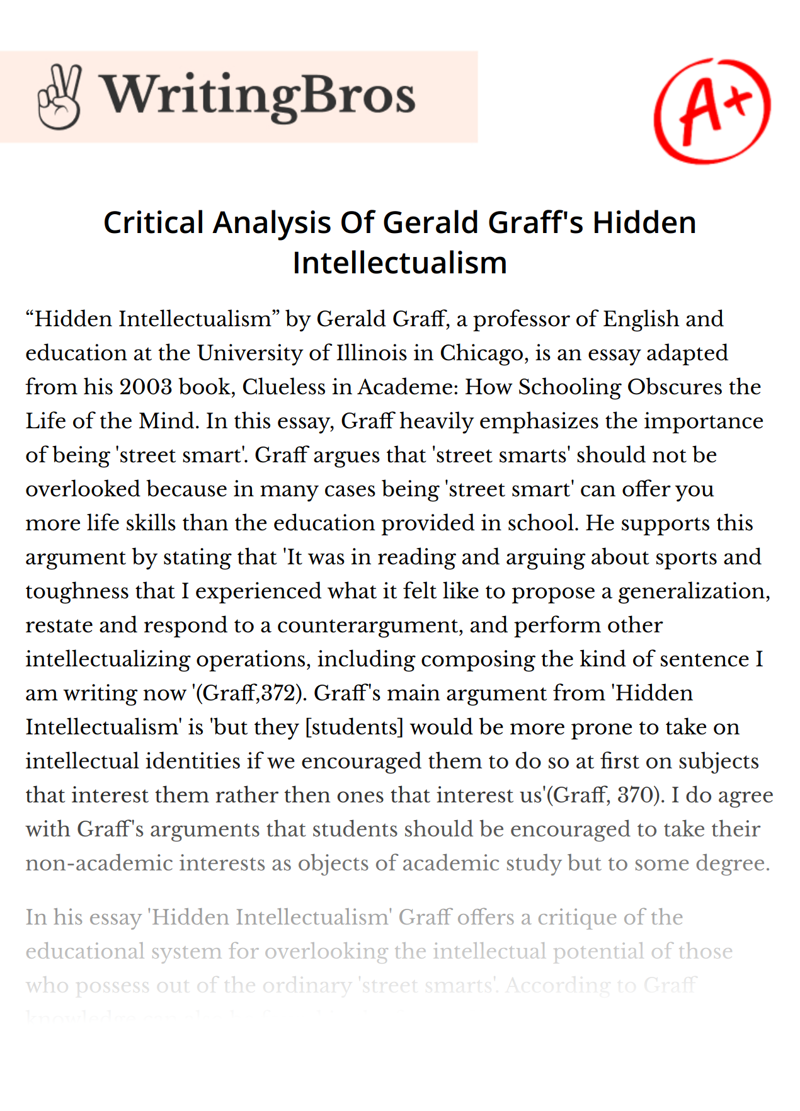Critical Analysis Of Gerald Graff's Hidden Intellectualism

“Hidden Intellectualism” by Gerald Graff, a professor of English and education at the University of Illinois in Chicago, is an essay adapted from his 2003 book, Clueless in Academe: How Schooling Obscures the Life of the Mind. In this essay, Graff heavily emphasizes the importance of being 'street smart'. Graff argues that 'street smarts' should not be overlooked because in many cases being 'street smart' can offer you more life skills than the education provided in school. He supports this argument by stating that 'It was in reading and arguing about sports and toughness that I experienced what it felt like to propose a generalization, restate and respond to a counterargument, and perform other intellectualizing operations, including composing the kind of sentence I am writing now '(Graff,372). Graff's main argument from 'Hidden Intellectualism' is 'but they [students] would be more prone to take on intellectual identities if we encouraged them to do so at first on subjects that interest them rather then ones that interest us'(Graff, 370). I do agree with Graff's arguments that students should be encouraged to take their non-academic interests as objects of academic study but to some degree.
In his essay 'Hidden Intellectualism' Graff offers a critique of the educational system for overlooking the intellectual potential of those who possess out of the ordinary 'street smarts'. According to Graff knowledge can also be found in the form of 'street smarts'. Graff begins with an overview of his childhood; using his love of sports as a point of argument. ' Only much later did it dawn on me that the sports world was more compelling than school because it was more intellectual than school, not less' (Graff, 372). Growing up in Chicago, Graff suggests academic knowledge is a hindrance in social life, as anti-intellectualism were more common during his childhood. Due to the conversations involving his friends, Graff believes that 'street smarts' overpower 'book smarts' for the fact that both community and culture thirst more for sports and entertainment than for academic subjects. Graffs point is that schools are not encouraging students to take their non-academic interests as objects of academic study; he urges schools to develop classroom units on sports, cars, fashion, rap music, and other such topics stating that this will further students literature and effectiveness.
Graff's argument throughout the essay made sense and was easy to understand. He used examples from his childhood that you could easily relate to. While Graff could have used different perspectives to further prove his arguments I do believe his points were backed up with logical evidence. For example, he stated, 'For students who get excited about the chance to write about their passion for cars will often write poorly and unreflectively on that topic as on Shakespeare or Pluto' (Graff,374). With this, he backed up his claim with 'Here is the flip side of what I pointed out before: that there's no necessary relation between the degree of interest a student shows in a text or subject and the quality of thought or expression such a student manifests in writing or talking about it' (Graff,374).
I believe Graff should have taken different opposing views into account when writing his essay on Hidden Intellectualism. Although the essay was lacking non-bias views since he took most of his argumental points from his past, I do believe the author is reliable since he did back up all of his claims.
I agree with Graff that it is important for students to write and talk about subjects that interest them. This conclusion, which Graff discusses in “ Hidden Intellectualism”, adds weight to the argument that by allowing the student to research on a subject that they are interested in, they will be more inspired to learn more about said subject. When students are interested in what they are learning, they can engage in critical learning and develop intellectual tactics. Intellectualization needs interests. Throughout the essay, I found myself agreeing with many of Graff’s assessments of what it means to be an intellectual. For one, he describes true intellectuals as anyone who can “turn any subject, however lightweight it may seem, into grist for their mill through the thoughtful questions they bring to it” (Graff, 370).
However, I believe that having a student write about an interesting topic is not enough. They will need guidance from an academic source to word, phrase, and frame their ideas into a language that will be accepted in a society that values education and academic intellectualism.
In conclusion, I agree with Graff on the important interests in an academic and social setting. However, I do not agree with his idea that “street smart” is better than “book smart”. I also do not agree with bias stress on sports.
Cite this Essay
To export a reference to this article please select a referencing style below

